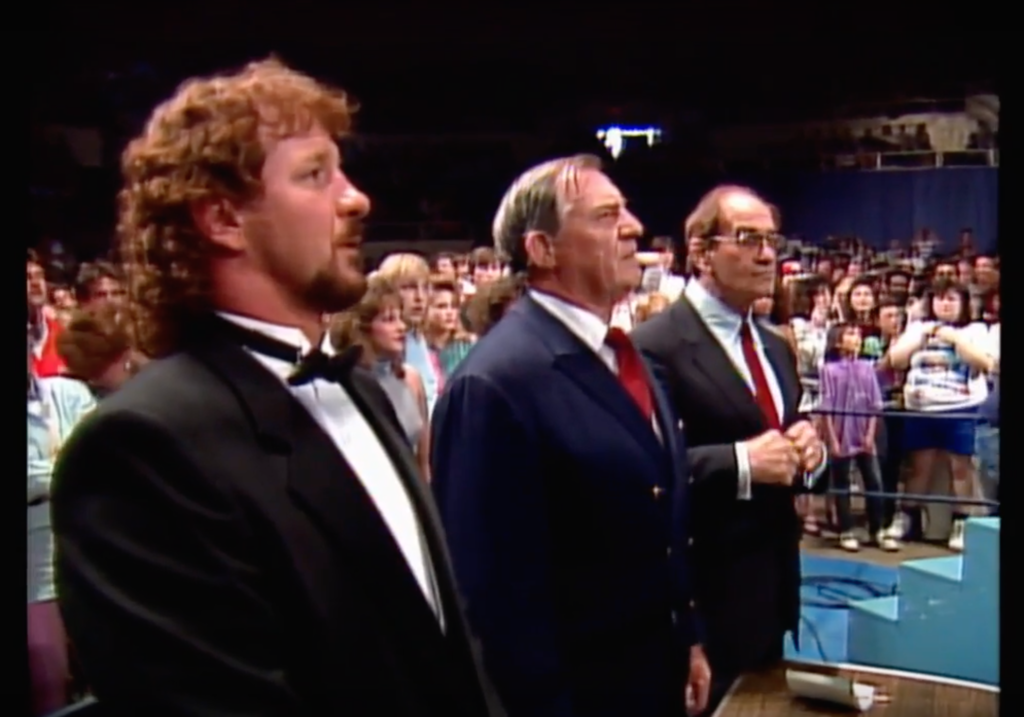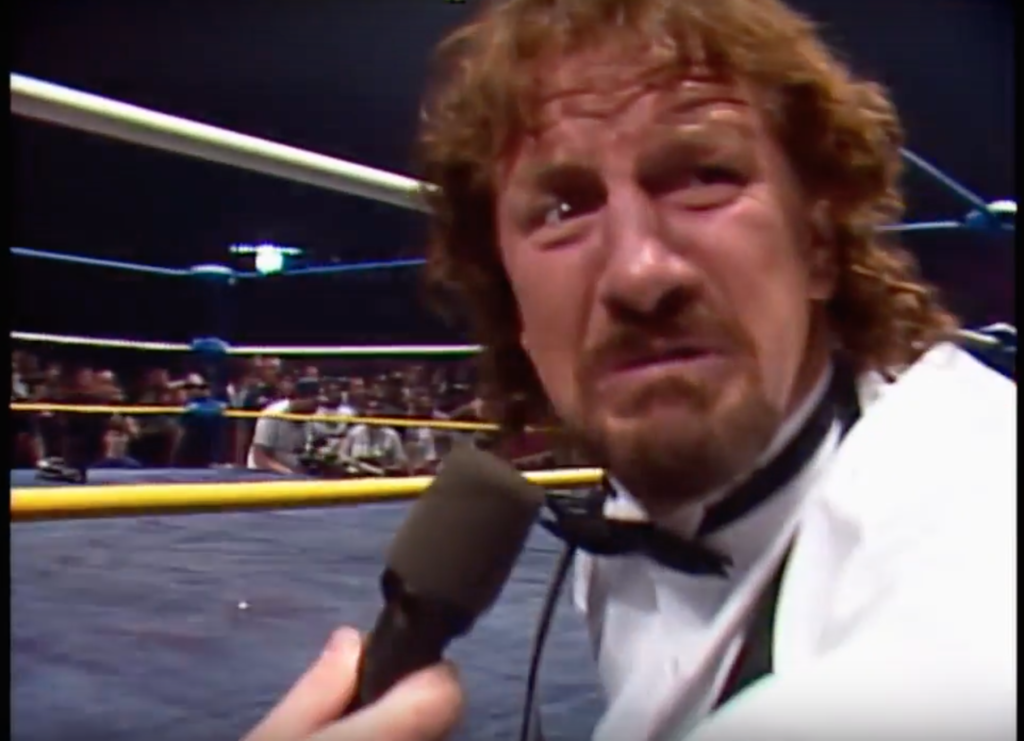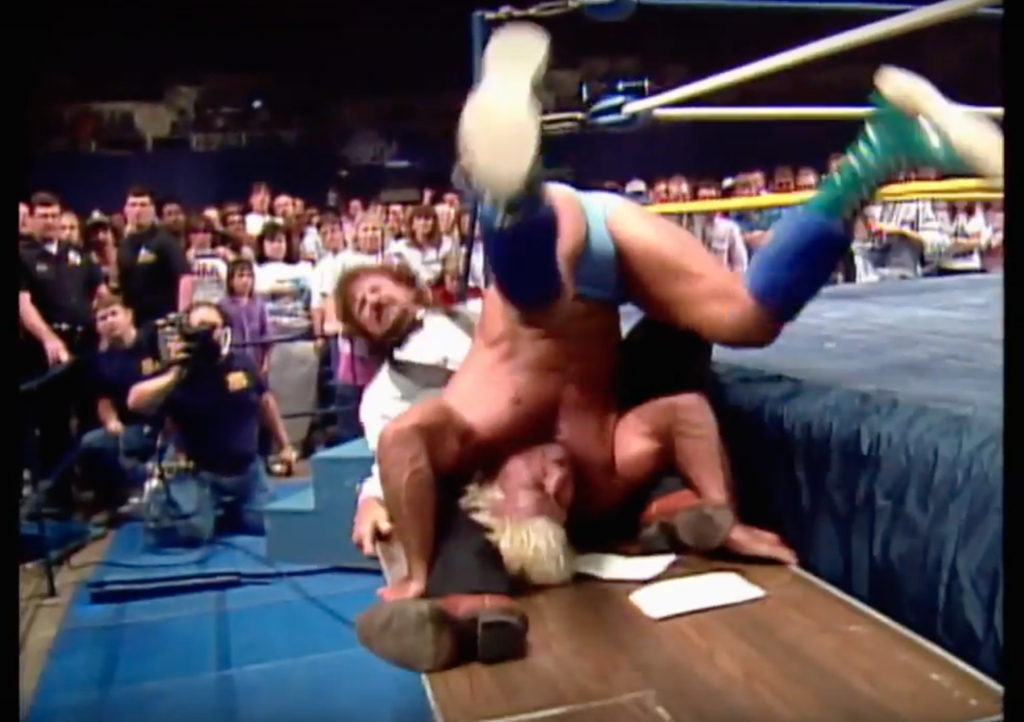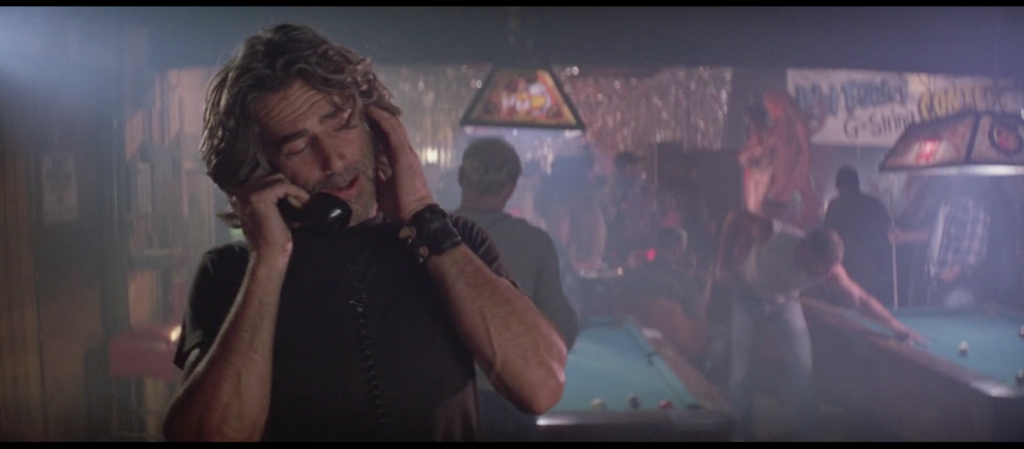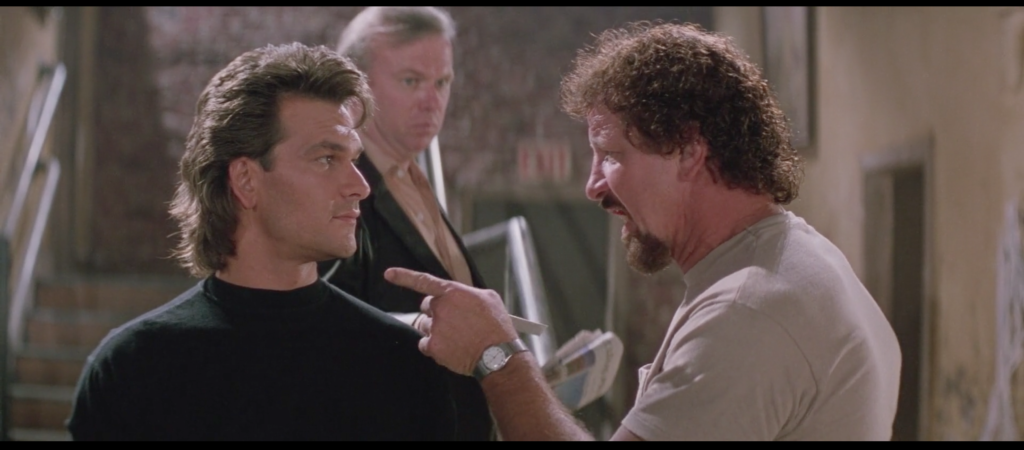Posts Tagged ‘terry funk’
161. Terry Funk Trilogy
June 10, 2019The same year he starred as Morgan, the man who tells Patrick Swayze he’d heard he has balls big enough to fit in a dump truck, in Road House, Terry Funk was a peripheral participant in what is widely considered to be the greatest series of wrestling matches of all time.
In 1989, “Nature Boy” Ric Flair and Ricky “The Dragon” Steamboat battled back and forth for the NWA World Heavyweight Championship in three major televised events: Chi-Town Rumble, Chicago, February 20; Clash of the Champions VI, New Orleans, April 2; and the inaugural Wrestlewar, Nashville, May 7. Each match ran over half an hour of continuous wrestling, significantly more so in the case of the Clash of the Champions fight, which was a best-2-out-of-3 falls encounter. Flair was a flamboyant bleached-blonde self-styled playboy and the greatest heel in wrestling; the contrast with Steamboat, with his raven hair, his presentation as a serious martial artist and working-class family man, and the purity of his babyface goodness, sold itself.
But the wrestling formed the real narrative and set a new standard. Naitch and the Dragon chopped, stretched, tossed, and slammed the holy hell out of each other in epic back-and-forths in which each individual body part being worked on felt like a pivotal supporting character. The trilogy charted Steamboat’s upset capture of the title from longtime champion Flair in Chicago, his successful defense of the belt in a controversial finish at the Superdome, and his almost anticlimactic defeat by Flair to regain the championship in Tennessee. (They fought each other at off-air “house shows” dozens, perhaps hundreds, of times; some of these fights, by their own account as well as those of contemporary observers, were even better than the big three canonical bouts.)
These matches are available on WWE’s proprietary streaming service, and may also be located with minimal google-fu on YouTube or one of its knockoffs. You can sit and watch all three matches back to back and feel as if you’re watching an intimate epic, The Return of the King crammed into the deliberation room from 12 Angry Men. If you want to be entertained and awed by the world’s most lucrative outsider artform, I can’t recommend “the trilogy” highly enough.
I bring this up not only because I just watched the trilogy for the first time, but because Terry Funk’s presence was such a treat for a Road House mark like myself. While absent for the Chi-Town Rumble fight, he was one of two ringside commentators during CotC, as well as a judge and…let’s say “audience participant” at Wrestlewar. I’ll tell you this, fight fans: Anyone who thinks Terry Funk isn’t one hell of an actor needs to listen to and watch those last two matches.
In the first, Funk is largely an offscreen presence, and an ebullient, gracious, and sweet-natured one at that. His distinctive, soft tenor rasp provides a sense of almost childlike delight at the herculean feats of Steamboat and Flair in the ring; if “I’m just happy to be here” had a voice, it would be Terry Funk’s during this match. Where is the man who called Dalton an asshole and a dead man?
He’s biding his time until the following month, that’s where he is. That is when, while Steamboat is still exiting the arena and his prior commentary colleague Jim Ross attempts to interview the triumphant Flair in the ring, Funk awkwardly inserts himself, repeatedly congratulating the new champ. It gets weirder and rings phonier as the segment goes on, and Flair, whose display of stamina and guts during the whole titanic series of matches had largely won over the crowd at a time when the line of demarcation between heel and face was much firmer than it is today, gets pricklier. When Funk says he’d like to be the first to challenge Flair for the title, it feels inevitable, and Flair’s pushback—that there’s an entire ranking system of top contenders, all of whom were around while Funk was off hobnobbing with Sylvester Stallone in Hollywood—feels justified.
Funk, as you might have guessed, disagrees, and goes absolutely apeshit.
He suckerpunches Flair, blasts him right out of the ring, and goes to town on him with the security railing, with a table, with a chair. In one spot that’s particularly frightening now, after a few intervening decades of broken necks and CTE, he piledrives Flair’s skull directly into the tabletop, toppling the whole edifice to the ground as they collapse onto it afterwards. Throughout, Funk is so furious he actually appears to start crying, tearing off his tuxedo jacket and screaming “You think you’re better than me???” at the defenseless champion while shrieking at the aghast and angry crowd.
Less than two weeks later, on May 19, Road House debuted. Along with the Clash and Wrestlewar matches, it comprises a Terry Funk trilogy of its own.
I feel I understand Morgan the bouncer a bit better now after watching Steamboat/Flair II and Steamboat/Flair III. After his genial turn as an announcer I can see how he might have sweet-talked Frank Tilghman into hiring him, and perhaps even initially persuaded his coworkers to like him. After his psychotic rampage, I can see why no one dared to fire him despite his manifest unfitness for the job, and why Brad Wesley kept him on the payroll to protect his nephew and his investments. After both, I see why Rowdy Herrington cast the person he cast for the role. You could say that Terry Funk brought a lot to the table.
118. Aw Shit Hell Kid
April 28, 2019I hate to do this to Terry Funk of all people—it’s still real to me, dammit!—but Sam Elliott is here to take the Mispronunciation Title right out of his hands. Watching and hearing Wade Garrett talk to Dalton is fascinating for at least six posts’ worth of reasons, but the adventure of listening to him go to work on the English language is right there at the top. When Dalton asks him how he’s doing, he replies “Aw Shit Hell Kid I’m in Hog Heaven,” and it sounds like it reads there—like he’s reciting a song title he’s never come across before but thinks is pretty funny now that he’s seeing it for the first time. He closes out the call by telling Dalton “I’ll see ya later,” but not as one sentence, no, that would be the easy way out, and Wade Garrett is made of sterner stuff. “I’ll see ya,” he says, then pauses, then adds, “Later.” I’ve told people “See ya,” and I’ve told people “Later,” but never have I done so back to back. No one has done so back to back, until now. Sam Elliott decided he was gonna have some fun with the line “I’ll see ya later” and Rowdy Herrington had the good sense to let him, just as he did when Terry Funk got creative with “You’re a dead man.” People talk about Scorsese and De Niro and “You talkin’ to me?” or the tears in rain speech from Blade Runner, but real heads know.
033. Dead man
February 2, 2019When Dalton fires Morgan, the irascible bouncer played by pro wrestling legend Terry Funk, from the Double Deuce because he doesn’t have “the right temperament for the trade,” Morgan reacts as if determined to prove this was the right decision. “You asshole,” he growls. “What am I supposed to do?” “There’s always barber college,” Dalton deadpans in reply. The rest of the staff laugh at Morgan then, openly and for what I’d imagine is the first time. Dalton has defanged him.
Pointing his finger in Dalton’s face, Morgan delivers his farewell prediction: “You’re a dead man.” He nearly smacks his severance check out of Tilghman’s hand as he grabs it, then storms away.
Road House fans—Roadies—enjoy this interaction a great deal. It’s at least partially obvious why: How often do you get to see Patrick Swayze (Dirty Dancing) and Terry Funk (Halloween Havoc ‘89) tread the boards together? But it’s Funk’s innovative line readings that make this a standout scene.
He previews the direction he’s headed when he calls Dalton an asshole, which he pronounces “asshole,” emphasis very much on the second syllable and, one assumes, that particular aspect of the anatomy. Two nouns combined to elicit a prescribed response, right? For Morgan—and he’s not the only person in the film to pronounce the word in this way—”hole” is the lead noun, not “ass.” In his eyes, Dalton is less the cheeks than the evacuating void between.
Still, this might have escaped notice were it not for the coup de grace: not “You’re a dead man,” as every other person in the history of the English language has pronounced it, but “You’re a dead man.” Here, the rationale is a bit harder to parse. Surely no matter what spin you put on this, dead is the most important, and insulting, aspect of the phrase, right? Dalton already knows he’s a man. Dead is the newsworthy part. And in making himself the bearer of this bad news, Morgan is issuing a threat. (This is all obvious, I know, but we’re being methodical.)
So why emphasize “man”? Not to praise Dalton, that’s for sure, despite the rubric established by asshole. He’s putting man front and center in the Shakespearean, “What a piece of work is” way. If we think of Dalton as a man, a human, we imagine all that entails: his infancy, childhood, adolescence, young adulthood; his need to breathe, eat, drink, sleep, excrete; his social and biological drives to form community and find a mate; his hopes and fears and lusts; his prodigious skill and significant renown as a bouncer-philosopher; his future in all its possibility and inevitability. One pissed-off ex-coworker later and this could all be gone, a man reduced to meat and thence to nothing at all. In his own dimwitted way, from a brain that processes only rage and schadenfreude, Morgan is driving home what Dalton stands to lose, and what he plans to take away.

